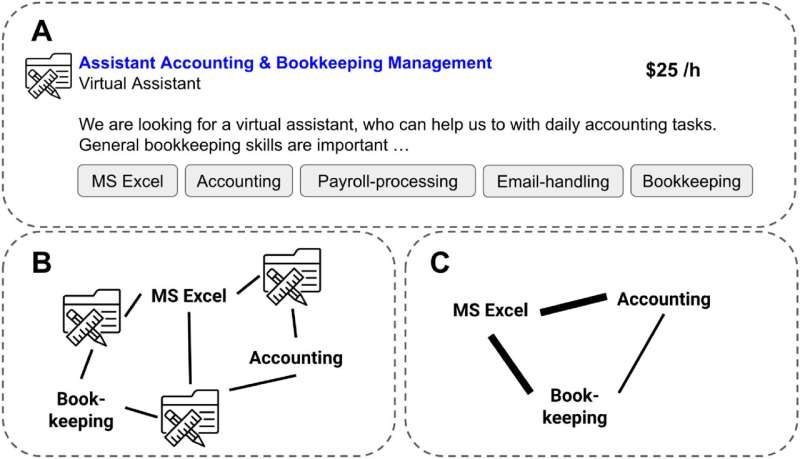This article has been reviewed according to Science X's editorial process and policies. Editors have highlighted the following attributes while ensuring the content's credibility:
fact-checked
trusted source
proofread
Artificial intelligence skills can increase salaries by as much as 40%, study suggests

Workers with artificial intelligence skills are "particularly valuable," and command salaries 21% higher than average, but potentially up to 40% higher—in part because these skills can be combined with other valuable skills—according to a study from researchers at the Oxford Internet Institute, and the Center for Social Data Science, University of Copenhagen.
The highly 'complementary' nature of AI skills (they can be combined with a wide range of other, often valuable, skills) proved a key factor in enhancing the value placed on workers' AI skills, the international team found. The research focused on 962 skills and 25,000 workers, found the economic value of a skill is determined by complementarity, or how well it can be combined with other worker competencies.
The expansion of novel technologies, in particular AI, was found to be strongly influencing the value of skills. Programming languages and data science, were among the most valuable. Of the frequently in demand AI skills, the top five in terms of economic value (as a percentage increase of hourly wages) to the worker were found to be:
- Machine Learning (+40%)
- Tensor Flow (+38%)
- Deep Learning (+27%)
- Natural Language Processing (+19%)
- Data Science (+17%)
Oii's Dr. Fabian Stephany, a co-author of the findings, says, "We know we never apply skills in isolation. Using this data, we saw which proficiencies were most sought after and which sets were in demand together, this allowed us to give skills and complementary skills a financial value based on the demands of the labor market."
Ole Teutloff says, "Conceptualizing the relationship between skills as a network enabled us to show the context dependency of human capital."
Dr. Stephany adds, "Our findings have profound implications for individuals, businesses, and policymakers. By recognizing the value of complementarity, we can better guide workers on their individual reskilling journeys in times of technological change."
The findings suggest the higher the potential of a skill to be combined with others, the higher its own value. Skills such as data analytics are valuable partly because they can be combined with other skills of high value. By contrast, skills such as photo retouching can only be combined with a specific set of other skills and, therefore, were found to have a lower value.
Published in the journal Research Policy, the study, "What is the Price of a Skill? The Value of Complementarity," used data from nearly 50,000 freelance projects posted on online labor platforms in the US between 2014 and 2022. The skills were mapped from completed projects to create a network showing their value in US dollars as well as their relation to one another.
Ole Teutloff is a Ph.D. fellow in Social Data Science at SODAS and the University of Edinburgh. He holds an MSc in Social Data Science from Oxford University and a Master of Public Policy from the Hertie School of Governance in Berlin. In his research, he investigates the impact of digital technologies on labor markets.
More information: Fabian Stephany et al, What is the price of a skill? The value of complementarity, Research Policy (2023). DOI: 10.1016/j.respol.2023.104898
Provided by University of Oxford




















